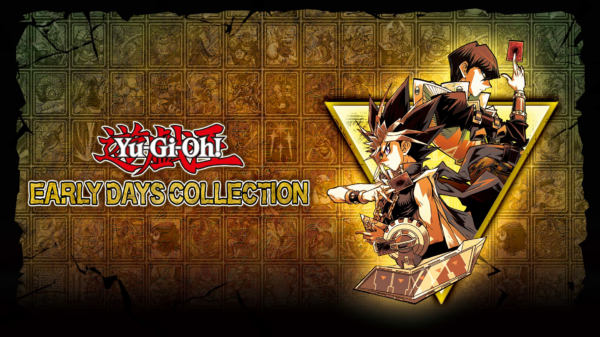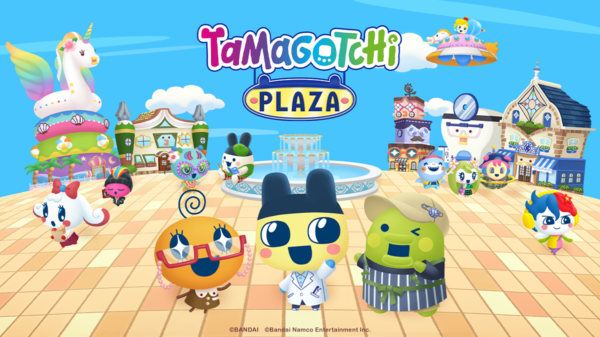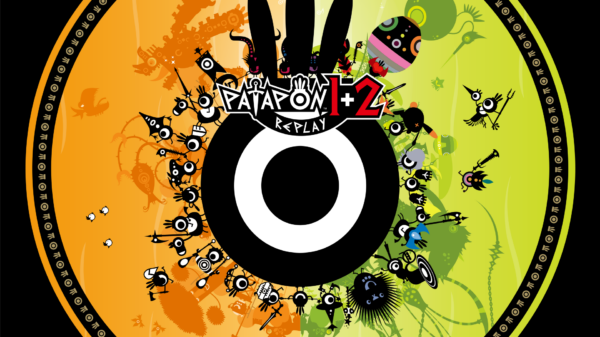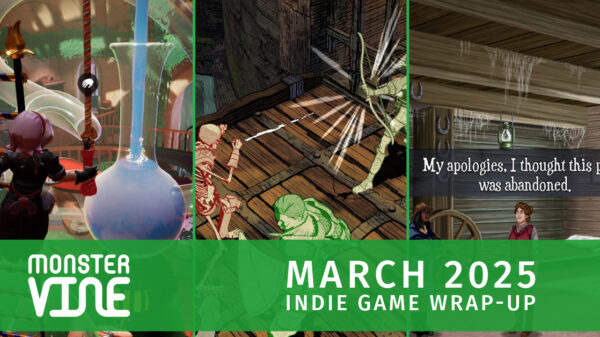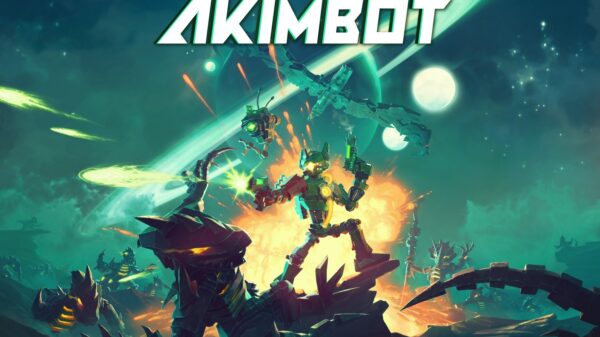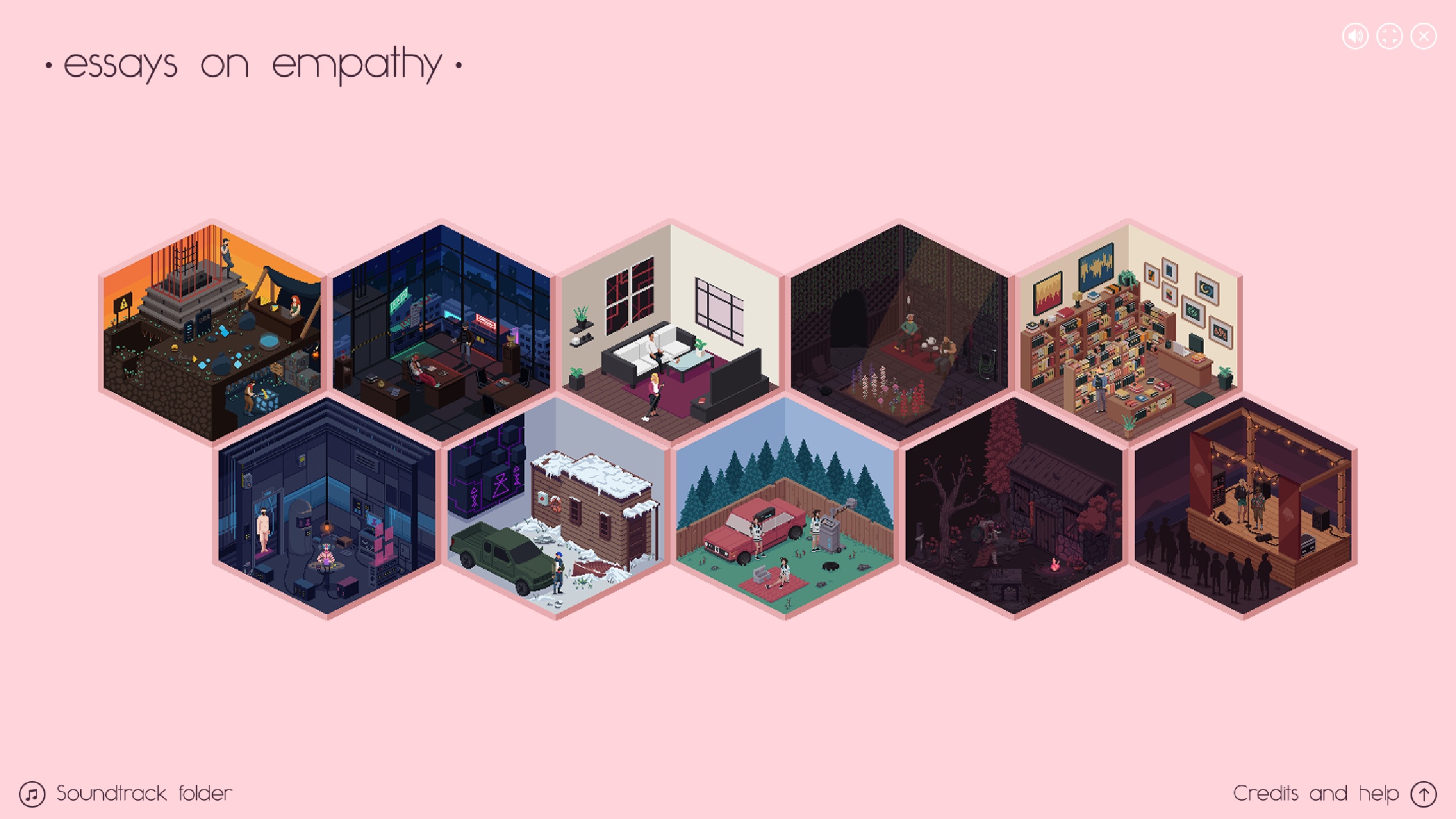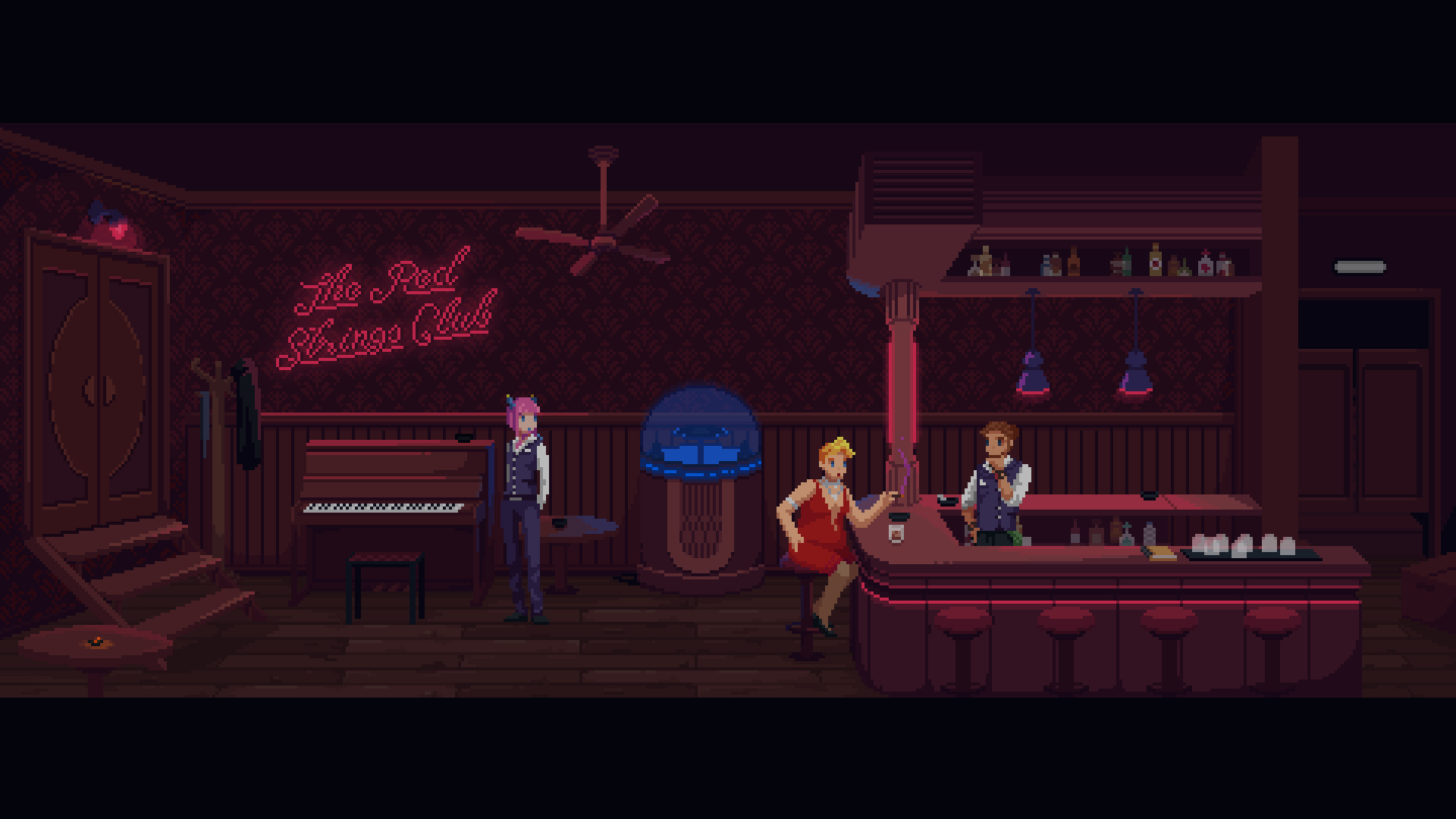I’ve been reflecting over the past year on what I want out of life. Trying to figure out what path led me to where I am today and why, as an artist, I feel so unfulfilled. Therapy, something I encourage just about everyone to dabble in, has been extremely helpful in figuring out who I am and what I want but isn’t necessarily the most inspiring thing. Yet, I suppose. Following small devs who create just to create is incredibly inspiring. Essays on Empathy is maybe the most inspiring thing I’ve played in the past decade. A suite of 10 bite-sized Ludum Dare projects (not all Ludum Dare projects but, in the spirit of) paired with videos discussing their themes and the inspiration for the games to give them context. For those out of the know, Ludum Dare is an online game jam where you create a game following a theme in 72 hours. It almost felt like I was at a film festival. Seeing Deconstructeam talk about their inspiration and how they developed the game, then getting to play it myself, felt personal. I loved it.
Essays on Empathy
Developer: Deconstructeam
Price: $13
Platforms: PC (Reviewed)
MonsterVine was provided with a Steam code for review.
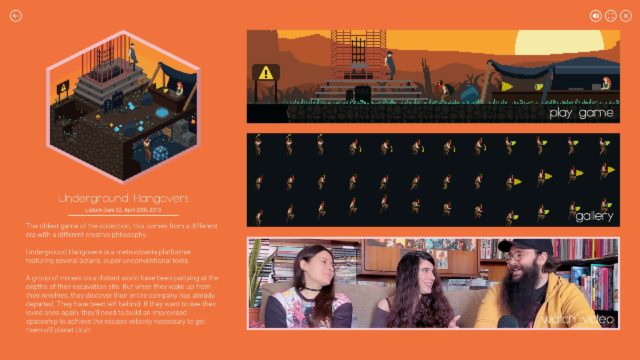
On launch, you’re presented with ten hexagons featuring little pixelated scenes. As you click into one, you’re greeted with a little blurb about the game and three options asking if you’d like to play the game, view the art gallery, or watch a video about the game. Likewise, the little info about what game jam the game was created for and what date it was released provides a lot of context about the game itself. Based on the layout of the menu I assumed I was supposed to play the game first and watch the video last but I didn’t do that. I watched the video first. I desired the context.
In each video, the people that make up Deconstructeam sit on a couch, in front of a Yeti mic, and talk about not just developing the game but where they were and what they were doing at the time of development. Jordi de Paco, Marina González, and Paula Ruiz ‘fingerspit,’ tell stories about who they are and how they bring themselves into the games. More importantly, though, they talk about how their art is important to them and what they want to convey with each piece. These aren’t just videos of game devs talking about the tech they used or why they went with a certain style, they’re sharing a piece of themselves with the world to add context to something they’ve already shared. The one thing I really gained from Essays on Empathy is that Deconstructeam is doing this because they absolutely love creating games. This is what you see when you venture off the beaten path and start looking below the surface of what gaming has to offer. These games aren’t extremely polished or presented in a perfect way but they are experimental and interesting and they tell incredible stories.
What I liked most about Essays on Empathy wasn’t just the incredible narrative focus in each game, but that there was a single story thread throughout the entire package itself. I didn’t just enjoy Essays on Empathy so much as fell in love with Deconstructeam. Deconstructeam, you may not know, is a developer that already has two incredible full-game releases up on steam with Gods Will Be Watching and The Red Strings Club and is teasing another on the way. Games 2 and 3 in Essays on Empathy are definitely prototypical if you’ve played The Red Strings Club. I seriously enjoyed what was offered in Essays on Empathy and definitely recommend it to anyone who is a narrative enthusiast or anyone interested in experimental gameplay. Beyond this point, I’ll be talking about each game specifically in Essays on Empathy. Not reviewing each game but discussing them, what they are, and what you should expect from each. I encourage you, if anything I write sparks your interest in Essays on Empathy, please check it out. These three people and the small team of colleagues they’ve collected truly enjoy their work, their art, and have poured their souls into their games. Essays on Empathy is well worth your money.
I should point out though, what you are paying for is context. Nine of the ten games included in this suite can be found elsewhere for free. The tenth game was absolutely worth the price of admission.
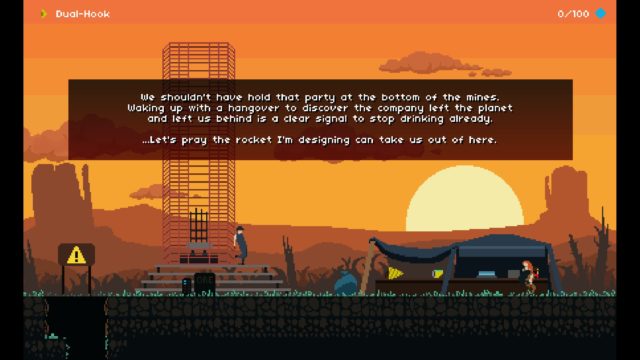
Game 1 – Underground Hangovers – Ludum Dare 32 – 4/20/2015
Starting here was rough. There’s a level of jank and strangeness to the game that is somewhat quaint but difficult to deal with. I did not spend much time playing Underground Hangovers. The pitch is that you and your friends were there to dig out a mine and have been having bitchin’ parties down there for the past few days. You wake up hungover only to find out that the company that sent you there has left and abandoned you there. Your goal is to get through the mine and collect enough materials to build a new spaceship. You’re primarily using a hook-shot that relies on gravity to create rope bridges. Too steep of a hook and you can’t use it as a bridge. It’s also your only weapon against space baboons. You’re unable to kill the baboons too, the hook-shot just holds them in place so you can get around them.
As you collect more materials to create spaceship parts your character starts moving slower, making returning to camp difficult.
Honestly, the whole experience was pretty funny and Deconstructeam thinks in a way that makes me extremely envious. But the game didn’t hook me for very long and after about 30 minutes of dying, I was ready to move on.
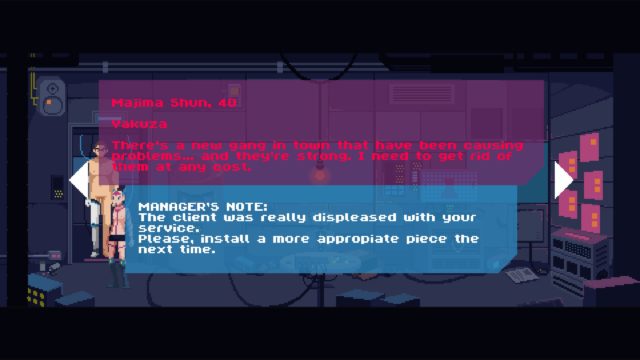
Game 2 – Zen and the Art of Transhumanism – Ludum Dare 35 – 4/18/2016
If you played The Red Strings Club this little game will feel familiar. Zen and the Art of Transhumanism has you take on the role of a cyborg (possibly?) who is essentially using a pottery wheel to create human modifications. Each one should improve the human’s life but in a ham-fisted way, the game gives you two options to choose from when creating the modifications. Each modification has a counterpart. For example, a Yakuza member wants to increase their strength to fight rival Yakuza better so he requests a strength implant. You have three options here, one option is to simply create the strength improvement modification and implant it into the human. Another option is to simply give them something they’re not asking for, however, they’ll return and you’ll get an angry note from your manager about meeting the customer’s expectations. I really appreciated this little addition. The final and correct option is to create a modification that suppresses the desire to enact physical violence.
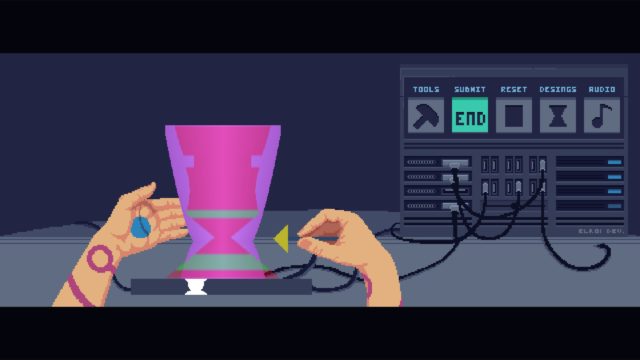
It’s incredibly obvious what you’re supposed to do and you can’t “finish” the game without following the correct path, at least as far as I could tell. I really appreciate the sentiment behind what Deconstructeam was trying to accomplish here. The idea that many of our desires and ambitions are only surface-level and we should be trying to achieve a higher understanding of ourselves. There will always be someone better at something, artificially improving yourself isn’t going to make you happy, be happy with who you are. Perhaps that’s just my interpretation but it seemed simple and not very well-executed here, but the sentiment was great. It was also nice to see the improvements from Underground Hangovers. Though Zen and the Art of Transhumanism takes place in a single scene, it felt more focused and achievable.
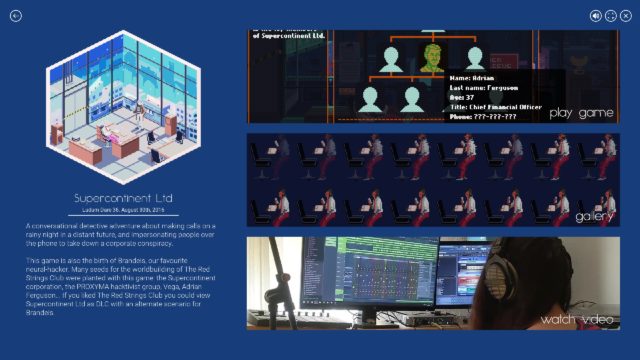
Game 3 – Supercontinent Ltd. – Ludum Dare 36 – 8/30/2016
I really felt like Deconstructeam found their feet with this game. It’s short, has some jank to it, some puzzles that I wouldn’t recommend creating, but it’s pretty solid the whole way through. More importantly, it has an interesting narrative structure. You’re somewhat of a hacker sent by someone to gain information about someone important at the company Supercontinent Ltd. Unfortunately, the man you’re supposed to find information about doesn’t even have a computer in his office, only a phone. Equipped with a voice modulator and a few numbers you gather around the office you can impersonate the man whose office you’ve infiltrated and if you gain enough information about other people in the company, impersonate them as well.
Not going to lie, it was actually fun to use my notepad for more than just taking heady notes about how I feel about what I’m playing for once, I was actually taking down phone numbers. A little jarring at first as they only used nine digits instead of the world standard of ten, I really enjoyed trying to figure out how best to gain more information with the numbers provided and the limited information I had. Another game that definitely leads into The Red Strings Club, Supercontinent Ltd. felt like the first substantial game that contributed to Deconstructeam’s style of design.
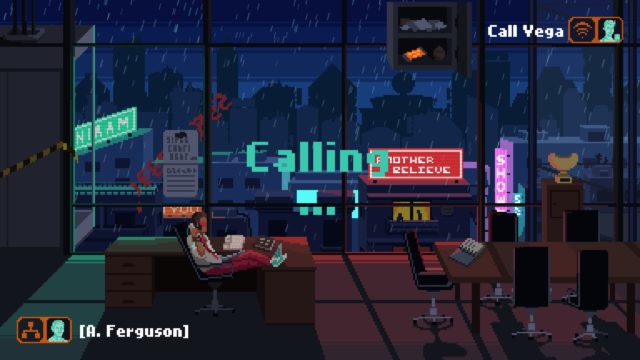
I thought it was cool and it made me excited for the next game.
Game 4 – Engolasters January 2021 – Ludum Dare 39 – 8/1/2017
Engolasters felt a little overambitious for what Deconstructeam was able to accomplish. It’s not that I didn’t like the game or what they were trying to accomplish with Engolasters, rather, it didn’t feel fleshed out enough. Engolasters January 2021 has you playing the role of Mari who has followed her dream of finding alien life. She has taken her husband and teenage son to Engolasters, Andorra to manage the observatory. Unfortunately for her, despite becoming very close to achieving her goals, her family is very unhappy. I’m not quite sure what Deconstructeam was going for with this game. The video was really cool, I really loved a lot of what they had to say about making this game and I’ll talk about that later, but they don’t really discuss what they were trying to accomplish here.

My takeaway from Engolasters January 2021 is that if you have a dream that leads you to an unusual life, make sure the people you’re getting involved with are also okay with that life. Mari’s husband, Jaime, is struggling to find work in such a place and as a result, is wildly depressed. After receiving a call from her son, Ricard, in which he tells her that she’s leaving because he hates living with his depressed father, Mari has a choice to make. There are some cool things in this game that I really liked even if I felt like the overall game was a little aimless.
Mari hops in her truck and starts heading back home to stop her son when she sees a U.F.O. and blacks out. She wakes up on the side of the road with a hole in her abdomen and is bleeding. In the top left-hand corner of the screen, you have three bars, battery power for your phone, health, and gasoline for your truck. As Mari simply exists she begins to lose health and you get a healthy dose of that as her blood shows up below her in the snow. When she makes it back to her truck she sees some strange, nonhuman, footprints. You can choose to simply return home here and are given a nice little screen that tells you what happened. In fact, you could even get a satisfying ending here if you really don’t care about aliens. This is one of the reasons I find Deconstructeam so fascinating. After receiving that ending I had too many questions so I dove back in.
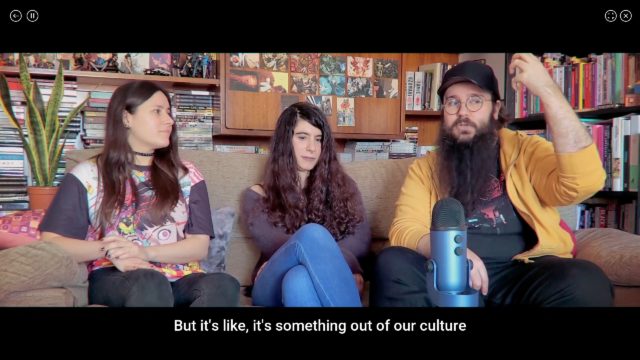
As far as I could find, there is definitely one truly bizarre ending that’s likely the canon one. However, what I was most interested in was the ability to give up on your dream. You call your son and he seems reasonable. There’s nothing in Engolasters for him, he has no friends, and the only other people he can talk to are his mother and father, one who is out all the time and the other so depressed they’re barely a person. With this information, you can abandon your job, return home, and begin packing for a new life. Both this and the canon ending were truly fascinating to me. We don’t know what led Mari to this point in her life, we’re not given that information and it’d be rude to assume. What we do know is that her husband and son were nice enough to let her explore this but as a result, took a hit themselves.
Now, we start seeing the thread of empathy.
Game 5 – Behind Every Great One – Ludum Dare 42 – 8/23/2018
As someone who lived in an abusive relationship for way too long, this game hit me hard. In fact, I found this game and the next to be extremely difficult to continue playing through, but for different reasons. Behind Every Great One has you taking on the role of Victorine, a housewife to a now-successful artist who is somewhat emotionally abusive. I say somewhat because when I see a topic like this explored, it’s usually done so in an extreme manner. I felt like Behind Every Great One was a little more true to life, which made it tough at times.

Behind Every Great One almost comes across as a time management simulator. There are tasks to perform around the house and not enough time to perform them all. So you do what you can and at the end of the day when Gabriel and Victorine sit down to dinner, he brings them up in a casual way that’s not at all demanding and definitely not passive-aggressive. Gabriel is in his studio all day painting while Victorine manages the house. So when Gabriel notices the bathroom is stinky, he says “We should really get to cleaning the bathroom,” as if there’s a chance he’ll help out.
Gabriel, who is downright cruel about not letting Victorine into his studio, manages to fall off a ladder while painting and yells at Vic when she enters the room to see what’s happened. With a broken leg, he’s unable to continue working and simply bitches about it while also goading Vic to get a hobby. Soon, Gabriel’s parents come to live with them and his mother casually berates her in front of everyone from how well she takes care of the houseplants to how chubby she’s gotten.
As long as I’ve been gaming I’ve seen people get beat to shit and just tortured in the worst ways possible but I have never had my heartbreak so much for a character as I have for Victorine. As she begins having anxiety attacks and trying to deal with the awful people in her life, it’s just a little too much. Incredible execution, great narrative, I absolutely adore the art and design in this game. It was a beautiful yet challenging experience to go through.

I should note that this game actually knocked me on my ass enough that I almost had to delay this review. After playing Behind Every Great One my brain kind of shut down and I had a rough rest of the day. I guess a bit of a warning for those in my shoes in a situation similar to this. Don’t tread into Behind Every Great One lightly, it’s very well done.
Game 6 – 11.45 A Vivid Life – A Game By Its Cover Game Jam – 10/25/2018

Yet another experience where I’m truly envious of the creativity shown on a conceptual level from Deconstructeam. 11.45 has you take on the role of a girl named Laynie who believes the skeleton inside her is not her own. Naturally, she steals an x-ray machine and goes off into the mountains to set up a camp and x-ray herself to figure out who’s skeleton it is.
Even more humbling is the narrative structure created by this game. There is no true canon path in 11.45, instead, you get to choose what happened in Laynie’s past. As you x-ray her, you’ll find things like a bullet in her thigh or a microchip in her hand. Remember how I said earlier that this game was hard to play? Well, that’s because Laynie brought a medical kit with her so she can fish these things out of her body. Using a scalpel from the medical kit, she creates an incision at the point where she found something and digs it out. Don’t worry, if you try to use the medical kit before you’ve found something, Laynie will remind herself of the promise she made to stop just blindly fishing in her body for things.

I’ve never played a game about self-mutilation so maybe that’s on me, but holy crap, this was hard to play. It’s also a game I really recommend. As you find things in Laynie’s body, you’re presented with three options to explain the thing inside of her. Being the product of abuse I followed a thread about an abusive boyfriend or father figure to Laynie but if you want, you can go down the alien or government conspiracy routes. It’s a fascinating way to set up a narrative structure and it was really cool.
Laynie also brought a radio with her to communicate with someone who simply replies to everything she says with, “Come back home.” This was a truly bizarre and interesting game.
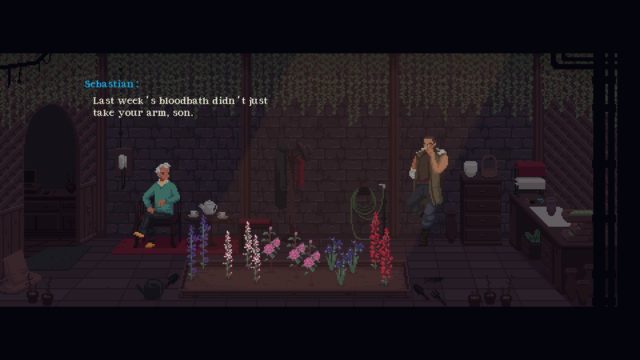
Game 7 – Eternal Home Floristry – Ludum Dare 44 – 4/30/2019
Deconstructeam likes creating set pieces and letting characters live there. Eternal Home Floristry takes place in the back of a florist shop in a metropolis with no soil. Back there lives Sebastian, the last in a line of florists that kept the shop open thanks to the small garden in the back. Right now, he’s housing a gay hitman who is hiding from the law after killing an important member of the local police force that was connected. Healing, after losing his right hand, he begs Sebastian to make him useful. The only thing Sebastian needs help with is creating bouquets of the last remaining flowers in the over-tilled garden that lives in the back of his shop.
The concept sounds like something out of a sitcom. Truly, it sounds ridiculous. However, the way Gordon, the hitman, and Sebastian converse is what drives this game forward. Sure, the bouquets will give you the outcome you desire but the back and forth between the florist and the hitman build a world around them.

I don’t want to get too deep into this one. I recommend people play this game even if they don’t get Essays on Empathy. Here, here’s a link, go play it.
Again, another thing to point out is how much you gain from the context of this game. The video discusses the ableism in the game as well as the difficulty with creating games in a non-native language. Deconstructeam’s primary language is Spanish and all of their games are written in English. If you’re a native speaker, it’s obvious with some of the grammatical errors but nothing is lost in translation. What they do that’s truly impressive is make a magical narrative experience, unlike any other games.
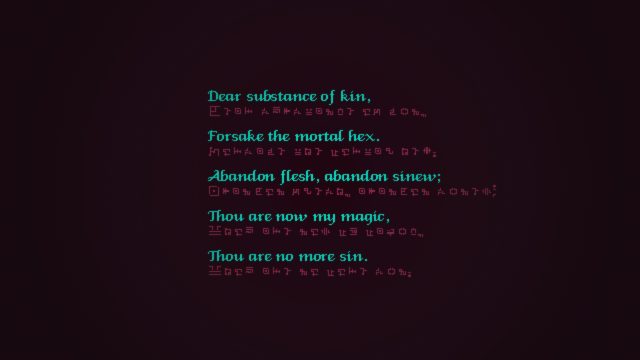
Game 8 – Dear Substance of Kin – Ludum Dare 44 – 4/30/2019
As much as I loved Eternal Home Floristry, Dear Substance of Kin is strictly badass. You take on the role of the coppersmith, who travels the village with his cauldron. If you leave a fire outside your door and a bloodied cloth, he’ll visit you and assist you with your desires. All he requires is a sacrifice from your kin.
I’ve really enjoyed the music and sound design created by Paula in all of the games so far but Dear Substance of Kin really got me. The low guitar riff with the heavy drums pounding as I made my way through town looking for the wayward souls begging for help really pulled me into Dear Substance of Kin. Everything went into creating a foreboding atmosphere even though I knew I was the thing people should be afraid of. I could probably talk about this game for hours, the imagery is so well done, and the way Jordi describes a man going from home to home with a giant bone to dip into broth just shines through in the finished product.
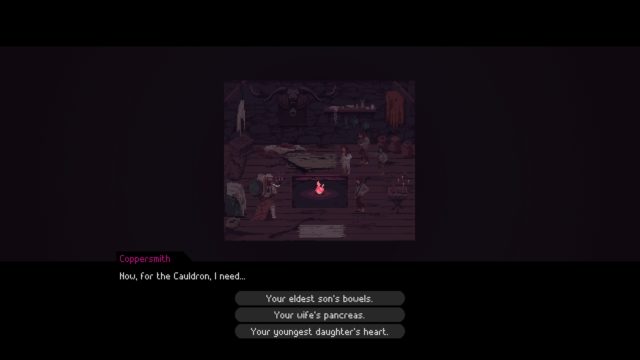
After visiting a home, the Coppersmith will grab the bloodied cloth and rip it off the door. Both the animation and the ripping sound resonated in my soul. It wasn’t just that the design and animation are good, rather, it also signified the end to my grim task. I wanted to learn more about this world and sincerely hope Deconstructeam makes a game that explores this world more.
Game 9 – The Bookshelf Limbo – A Gift – 2/20/2020
In the video, Deconstructeam explains that their friend Ivan wanted to make a game for his birthday. So they made this very short game where the main character is trying to find a graphic novel to introduce their father to the genre. As someone who has no interest in introducing his father into any aspect of his life, I didn’t really connect with this game. Not that there was much to connect with, the game merely has you browsing a rack of books in a bookstore.
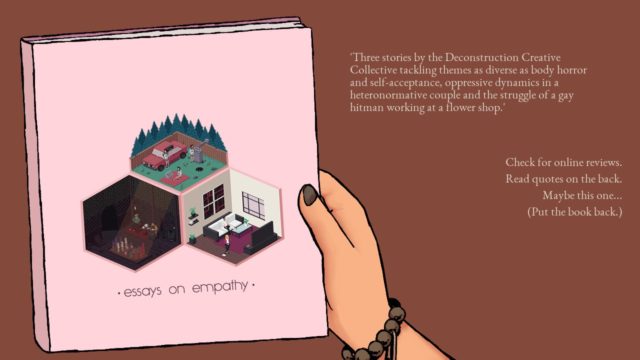
This was a quick game with some nice ambiance and writing.
Game 10 – De Tres al Cuarto – Exclusive to Essays on Empathy – 5/18/2021
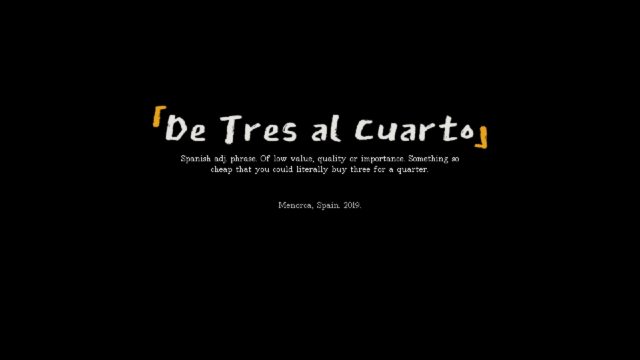
De Tres al Cuarto is an absolutely lovely game that I hope everyone gets a chance to play at some point. The elevator pitch is a deckbuilding game about comedy. Unfortunately, these are not very good comedians. The pair of comedians are new at working together, though Bonachera has been in the comedy game for some time. He’s decided to team up with a younger, less well-known comedian named Garza as they go to Menorca, Spain to open for another act.
The deck-building is simple. You’re playing as Garza and are the main comedian. Bonachera sets you up, you knock ‘em down. There are only four cards at play when telling jokes and it’s a stacked deck right from the start. When you tell jokes, you’ll be receiving inspiration points based on how good the joke was and how long you kept it going. The cards tell you whether or not you’ll be succeeding at joke-telling. You have blank cards, build cards, poor cards, and punch cards. Using a blank card will screw up the joke entirely, it’s a bad card and one that results in no points. The build card is where it’s at, as using a build card will allow you to continue to build into a clever joke and net you the most amount of points. There is a caveat though as you can only build up to 3 times, using a build card four times in one joke is the same as using a blank card and nets you no points. Use it right though, and you’ll net a 3 times multiplier for the inspiration points you get. A poor card gets you half points and a punch card gets you full points.
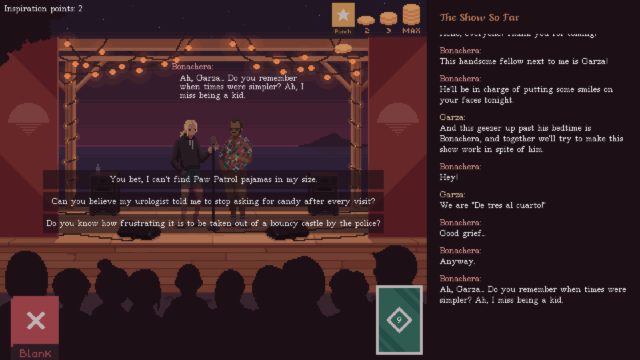
The jokes are… bad. Like, really bad. But that’s the point, right? When you’re not on stage, you’ll be doing things around the island and becoming closer to your partner. You learn things about the two of them, the things they’ve done in their past, how they got here, and what their future holds. A quarter of the screen will always be dedicated to text. On stage, the text box will be titled ‘The Show So Far’ and will be a chat log for the jokes. When out and about together, the chatbox becomes ‘The Hidden & the Unknown’ and becomes a place for introspection as Garza and Bonachera experience the island together in both thinking about the future of their careers and a budding romance.
I would have loved a full game like this. De Tres al Cuarto is truly inspired and will definitely live in my head for the next few months.
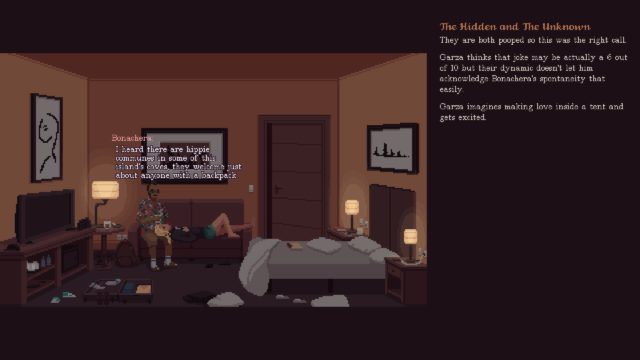
For a developer that focuses on narrative design, structure, and experimentation, Deconstructeam got off to a bit of a rocky start but my favorite thing about Essays on Empathy is that there’s a narrative thread that goes through the product as a whole. Though each game is different, has its own story and experiences attached to it, the through thread seems to be a team of people that create art and allow their creative vision to make them better people. Likewise, I feel like I’ve become a better person just in the past week of experiencing these games.
 The Final Word
The Final Word
I’ve always said that the best and most interesting games are being made at the experimental level in game jams and Essays on Empathy proves that. If you’re skipping Essays, at least check out Deconstructeam’s itch.io page.
– MonsterVine Rating: 4.5 out of 5 – Great


































